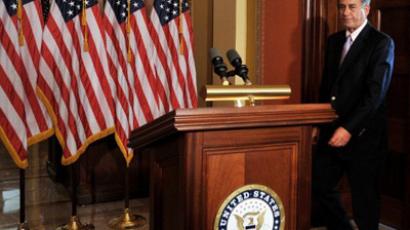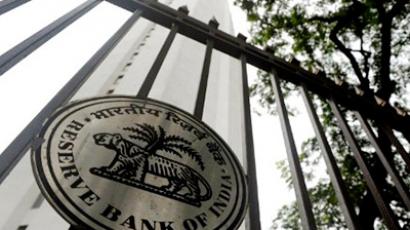The US is kicking the debt problem down the road
After months of political squabbling in the shadow of a looming default, the US can finally breathe a sigh of relief, as President Barack Obama has signed a bill to raise the country's borrowing limit soon after an 11th-hour deal passed the Senate.
This debt bill, which has been waited for with bated breath around the world, is really just a political game that the US did not necessarily have to go through, argues RT correspondent Lucy Kafanov.Raising the debt limit is a relatively routine thing for the US, which has been done more than 100 times since 1940. But the Tea Party faction of the Republican Party has turned this routine legislation act into a proxy battle over ideological differences.The Republicans think that the US has gotten itself into this fiscal pickle because of spending on social programs and keeping taxes too high, a view with which the Democrats completely disagree.The Republicans also wanted to put President Barack Obama in as uncomfortable a political position as possible in the run-up to the 2012 election. But in the end both sides walked away unhappy with the deal, which, Kafanov declared, changes nothing except averting a self-imposed debt crisis.With the US struggling with slow economic growth and a high level of unemployment, many economists are saying that this is not the time to curb spending. The pending legislation, however, promises to limit the amount of government spending. The legislation also creates a “super committee” to deal with the issue.The biggest losers in this deal are the American people, who are simply struggling to get along in what has been one the most catastrophic recessions the US has seen in a long time.
Neil Sroka, press secretary for the Progressive Change Campaign Committee, believes the legislation is going to start hitting the American people quite soon, and directly.“It’s not going to work for the American people,” he said. “The kind of austerity that was laid out in the bill and is going to be laid out in future as it gets carried out down the road, it’s actually going to hurt jobs, which is the last thing the American people want right now.”Sroka thinks the only winners in this situation are the Tea Party conservatives, who, he says, got exactly what they wanted.“They are crying crocodile tears over on Capitol Hill,” he said. “But the fact of the matter is, if they got a bill passed through the House and the Senate that does not have a single tax raise on the wealthiest Americans and they moved toward cuts to the social services that they wanted to cut for decades – the Tea Party Republicans got their win, and unfortunately the president and far too many Democrats handed it to them.”
Roger Hanwehr, a financial analyst with ArcXeon, argues that the bill does not address the underlining macroeconomic problems that the US faces.“There is an urgent need for resumption of economic growth, creation of wealth and particularly revenue-generating jobs among the broad consumer component of the population,” he said.“Unless the United States increases government revenues or drastically slashes costs, this problem will come back,” Hanwehr stated.The US needs to increase revenue against costs, he said, but this type of plan for massive cuts in federal spending could have an indelible impact on the economy itself.“At some point the cuts will have a significant impact in furthering recessionary trends,” Hanwehr argued.“On the other hand, if wealth isn’t generated, the tax pay shrinks, further reducing government revenue – those are the fundamental issue that will face the United States in the next three-four years,” he said.Hanwehr warned that if the economy deteriorates further, the dollar slides and oil prices are unstable, then one the three rating agencies may revise America’s AAA bond credit rating.The downgrading of the US’s rating would further confirm the general sense felt around the world that the overall perception of the US as an economic superpower has been severely undermined, he explained.“But even if there is no downgrade in the ratings’ status, the overall inability of the US political leadership to mount a united front and address these issues has severely damaged US economic credibility and currency policy in Asia and in Europe,” Hanwehr concluded.














